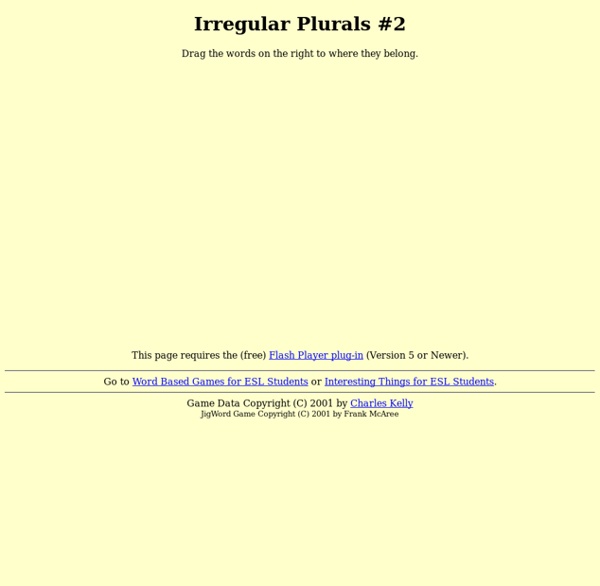JigWord for English Study - Irregular Plurals #1 (Flash 5 Required)

KS2 Literacy
Different types of words can be used to make your writing more interesting and easier to read. You need to know when to use them and how to spot them. In writing, words are grouped together into phrases, sentences, clauses and paragraphs. Linking these building blocks together in the right way makes your writing easy to understand and interesting to read. Use your commenting skills to identify what's wrong with these pieces of writing. When you are writing non-fiction it's important to use a style of writing that fits the subject.Use your knowledge of non-fiction writing to group the correct titles, text and pictures together. © v2vtraining.co.uk The Look, Say, Cover, Write & Check is a support tool for learning spellings using a trusted multi-sensory approach. This activity helps prove the rules of changing nouns from singular to plural. This is an activity targeted to Year 4 to help with medium frequency words. An updated version of the traditional word guess game.
Rules
If you can't see the Babylon translation box, use this link for <a href=" or this one for <a href=" Descárgalo gratis aquí En inglés, la mayoría de las palabras se pluralizan agregando una "s" al singular, pero veremos que también hay otras formas. La mayoría agrega "s" al Singular Hay palabras con plurales irregulares Hay sustantivos que son siempre plurales Algunos sustantivos tienen la misma forma en el plural y en el singular Cuando terminan en " s/z/x/sh" o "ch", agregan "es" para formar el plural Cuando los sustantivos terminan en "o" hay dos maneras: -Si la "o" es precedida por una consonante, las palabras agregan "es". -Si la "o" es precedida por una vocal, agregan "s" Cuando los sustantivos terminan en "y", hay dos maneras: -Si la " y" es precedida por una consonante, la " y" cambia por "ies" -Si la "y" es precedida por una vocal, agregan una "s" Cuando terminan en "is", cambian por "es"
Related:
Related:



